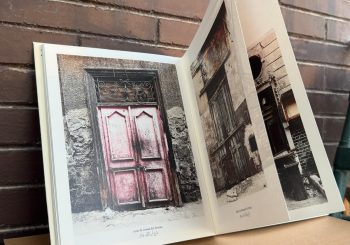When Masry Sayed El-Araby, the protagonist of the 2010 film ‘Asal Eswed (‘Bittersweet’), gets on a plane to finally visit his native Egypt after decades in the United States, he is immediately met with one the conversational courtesies common in Egypt: When he sneezes, the man sitting beside him responds with a “Yarhamukum Allah” (God bless you).
Masry, portrayed by Egyptian comedian Ahmed Helmy, knows what to do of course; returning the courtesy is simple enough. “Allah yerhamak,” he responds. Little does he know that while his response also translates to ‘God bless you’, this particular phrasing is actually used to bless the souls of the deceased.
While only a throwaway gag in a truly bittersweet comedy about the hardships and injustices Egyptian citizens face in their own country and the unflattering truths about the privileges of a foreign passport, this joke is nothing if not realistic. Egyptian Arabic is peppered with similar courtesies, each used on specific occasions, and each with its own specific response. For someone who is not immersed in everyday Egyptian culture, it is difficult to keep track of them all.
For the benefit of diaspora Egyptians like Masry, as well as non-Egyptians trying to grasp the intricacies of everyday Egyptian colloquialisms, here is a list of some of the most common phrases, when they are used, and the specific responses they are associated with.
Disclaimer: While some of the phrases below were easy to translate into English, others were more challenging. The loose translations provided are an attempt to bring the meaning as close as possible to readers.
Yarhamukum Allah — (‘God bless you’)
When it is used:
As mentioned above, this phrase is used in response to someone sneezing. Some Egyptians say that it should only be used if the sneezer says ‘alhamdulillah’ (‘thanks be to God) after sneezing, while others say it can be said directly.
How to respond:
Contrary to what Masry seems to think, the correct response is ‘yarhamna wa yarhamkum,’ meaning ‘may he bless us and bless you’.
Salamtak — (‘Your health’ or ‘your safety’)
When it is used:
When someone is ill or injured, the common response in Egypt is to say ‘salamtak’.
How to respond:
Straightforward enough, the response is ‘Allah yesallemak,’ which translates to ‘may God keep you safe’ or ‘may God keep you healthy’.
Hamdellah ‘ala el Salama — (‘Thank God for your safety’ or ‘Thank God for your safe return’)
When it is used:
When someone has just ended a long trip, Egyptians greet them saying ‘hamdellah ‘ala el salama’. This can be said from anywhere, not only for those greeting someone who has arrived where they are now. For instance, when someone sends a text message telling their loved ones back home that they have landed somewhere abroad, Egyptians will usually respond with the same phrase.
‘Hamdellah ‘ala el salama’ can also be used when someone returns to action after recovering from illness or injury. If someone comes home after spending time at the hospital, or if someone comes back to work following a period of sick leave, they are likely to hear this phrase from Egyptians around them.
How to respond:
Just like ‘salamtak’, the response to ‘hamdellah ‘ala el salama’ is a simple ‘allah yesallemak’.
Tesbah ‘ala Kheir — (‘May you wake to good things’ or ‘May you wake to good news’)
When it is used:
Functionally, ‘tesbah ‘ala kheir’ is used just like ‘good night’, only it has a somewhat more poetic meaning.
How to respond:
To match the poetic wish, the response to ‘tesbah ‘ala kheir’ is ‘wenta men ahlo’, literally translating to ‘and you are of its people,’ meaning essentially that the wisher is a good person.
Sah el Nom — (‘Healthy Sleep’)
When it is used:
‘Sah el nom’ is a phrase used to greet someone who has just woken up. It is not quite the same as the standard morning greeting, ‘sabah el kheir’ (‘good morning’), as it can be used at any time of day. In fact, it is almost said more frequently after naps in the middle of the day.
How to respond:
Often, people do not give any specific response to this phrase, and even to some Egyptians residing at home, the reply that comes with ‘sah el nom’ is not known. However, ‘sah Allah badanak’, meaning ‘may God keep your body healthy’ has long been associated with it.
Na’iman — (‘Blissfully’ or ‘with bliss’)
When it is used:
‘Na’iman’ is one of the phrases whose meaning bears a less direct connection to the context it is used in. It is said to someone who has just completed the very quotidian task of taking a shower. Its only other use is to say it to men who have just received a haircut.
How to respond:
Some respond to ‘na’iman’ in standard Arabic, saying ‘an’aam Allah ‘alaykom,’ while others give the more colloquial reply, ‘Allah yen’aam ‘aleik’. Both mean something along the lines of ‘may God grant you bliss’.
Al Baqaa’ Lellah and El Ba’eya Fe Hayatak — (Loosely translated, ‘Eternity is only for God’ and ‘Their legacy is in your life’)
When it is used:
Both of these phrases are used to express condolences to someone who has lost a loved one. The first is in standard Arabic and more formal, while the second is in conversational Egyptian Arabic. While some years ago, the latter was used more frequently, the more formal of the two has grown more common in recent years.
How to respond:
To the first, the response is one that is not exclusive to ‘al baqaa’ lellah’, but rather frequently used to echo pleas and prayers addressed to God, and it is ‘wa ne’ma bellah’. Meanwhile ‘el ba’eya fe hayatak’ has its own unique response, ‘hayatak el ba’ya’, meaning something close to ‘may your life last’.
Shakar Allah Sa’yak — (Loosely translated, ‘Thank you for your effort’)
When it is used:
In a ganaza (funeral) or ‘aza (wake), the surviving loved ones of the deceased express their thanks to those who have come to pay their respects by saying ‘shakar Allah sa’yak’. While the English translation may sound generic, this particular phrasing in Arabic is used almost exclusively in this context.
How to respond:
The response to ‘shakar Allah sa’yak’ is ‘’azzam/atham Allah agrak’, meaning ‘may God reward you greatly.
Sofra Dayma and Dayman ‘Aamer — (Loosely translated, ‘May the offerings of your table last’ and ‘May your hospitality last’)
When it is used:
A guest would usually say this to their host after a meal as a way to express their gratitude for their generous hospitality.
How to respond:
The response to both phrases is ‘yedoum ‘ezzak’, meaning ‘may your prosperity last’.
Menawwar — (‘You bring light’)
When it is used:
This phrase is used when someone arrives or enters a place, as an expression of welcome. An alternative to it is ‘nawwart’, which means the same thing.
How to respond:
The most common response to ‘nawwart’ and ‘menawwar’ is ‘dah nourak’ meaning ‘the light is yours’. When someone says ‘nawwart’ to welcome someone entering their home or arriving in their country, a common response is also ‘menawwara be ahlaha’, which translates roughly to ‘it is brightened by the light of its people’.
Teslam ‘Eidak — (May your hands remain safe)
When it is used:
This is an alternative for thank you, but only if the act receiving the thanks is a manual one. The most common context this phrase is used in is to thank someone who has cooked a meal, though it is not exclusive to that. For instance, one could say it to a carpenter or a repairperson upon completing their handiwork.
How to respond:
If ‘teslam ‘eidak’ is being said in the context of food, the cook will often respond with ‘bel hana wel shefa’ (translated below). However, whether it is for culinary handiwork or any other kind, other responses to the courtesy are ‘teslam’ (‘may you remain safe’) or its more personal alternative ‘teslamli’ (‘may you remain safe for me’), ‘allah yesallemak’, or a very simple ‘shokran’ (‘thank you’).
Bel Hana Wel Shefa — (With pleasure and health’)
When it is used:
Though ‘bel hana wel shefa’ may be said in response to ‘teslam ‘eidak’, it may also be said unprompted. It is used somewhat similarly to bon appetit, and is usually said by the cook or at least the host.
How to respond:
The response to ‘bel hana wel shefa’ is ‘Allah yehannik’, meaning ‘may God grant you pleasure’.
Subscribe to the Egyptian Streets’ weekly newsletter! Catch up on the latest news, arts & culture headlines, exclusive features and more stories that matter, delivered straight to your inbox by clicking here.






Comment (1)
[…] Source link […]